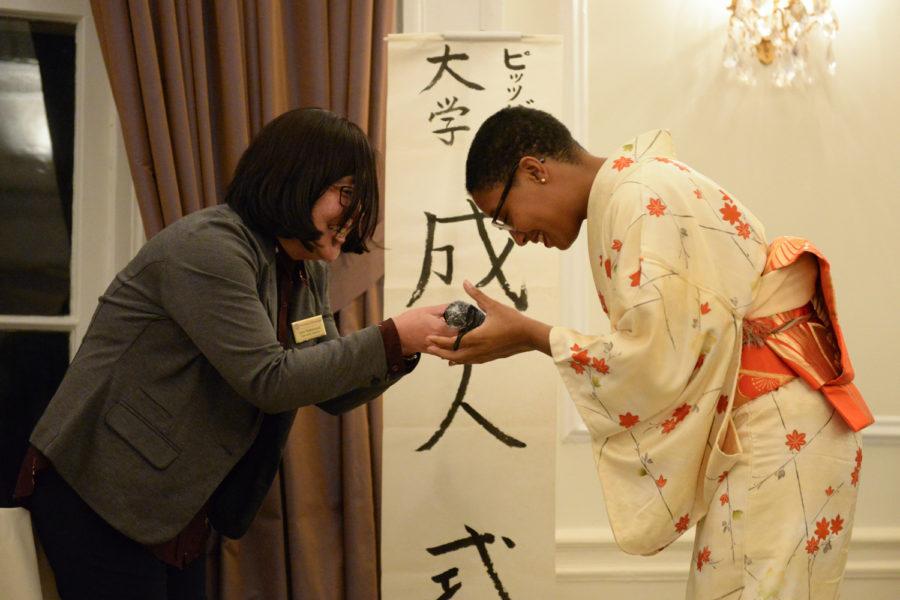Wrapped in a floral kimono, sophomore Nika Tanimoto hurried up to the podium in the ballroom of the University Club, bowed and accepted a delicate black umbrella. It was a token of celebrating her coming of age.
“Today I am celebrating becoming an adult,” Tanimoto, an English major at Yasuda University in Japan, said.
Tanimoto was one of 30 participants in the traditional Japanese Coming of Age Ceremony Wednesday night. The Coming of Age attendees included students learning Japanese at Pitt, Japanese exchange students from Chatham University and international students from Yasuda University in Japan enrolled in a five-month course through Pitt’s English Language Institute. The Asian Studies Center and English Learning Institute at Pitt cohosted the ceremony — more than 6,000 miles away from Tanimoto’s home in Japan.
The Coming of Age ceremony in Japanese culture — known as Seijin-no-Hi — takes place the second Monday of January. It celebrates people who have reached 20 years of age — when they’re officially allowed to smoke, drink, drive and gamble. The holiday was first established in 1948 as part of a postwar recovery movement aimed at symbolic cultural rebirth.
Tanimoto said she saw plenty of pictures on social media of her friends celebrating Coming of Age Day in Japan on Jan. 8. She was sad she couldn’t be with them but grateful to have the ceremony in Pittsburgh.
She said the Coming of Age ceremony in Japan is a significant event, with every 20-year-old man and woman in a town dressing up and city officials giving speeches about the young people’s transition from childhood to adulthood.
“Every 20-year-old student gets together in the city hall and usually the city mayor gives a speech,” she said. “And we have a reunion.”
Tanimoto said she doesn’t know if she will celebrate her coming of age with her family when she returns to Japan Jan. 20, when her program ends. She plans on writing them letters of appreciation for helping her reach this turning point in her life.
The idea to host the ceremony here for Japanese students struck Lynn Kawaratani, acting associate director of the Asian Studies Center, in 2017 when the first-ever group of international students from Yasuda University at Pitt was unhappy about missing the ceremony back home. She worked with multiple organizations — such as the Japanese Nationality Room Committee and the Japan Association of Greater Pittsburgh — to make the event possible.
Preparation for the ceremony began with female participants donning kimonos, elaborately constructed garments with multiple layers, which took some up to 30 minutes to don. The kimonos were provided by the groups who supported the event. Sophomore rehabilitation science major Yumeng Dai said it was a lot of work to get dressed.
“This is like 15 layers,” Yumeng said, motioning toward her kimono. “There [were] like five people dressing me, so apparently this is really hard to do.”
The kimono is an iconic representation of Japanese culture that used to symbolize power and status but now marks the significance of an event or ceremony.
“I have never dressed in a kimono before, and from the looks of it, it didn’t seem that complicated,” Yumeng said. “But I experience it, and wow, there is so much work put into this, and people really value this as one of their traditions.”
The ceremony opened with two members of Pittsburgh Taiko, a local Japanese percussion ensemble, raising their arms and beating either end of a long, horizontal drum with wooden sticks. The group chanted and sent a pulsating rhythm sounding through the walls of the ballroom.
The rousing beats were followed by several speeches by representatives from the English Language Institute, the Japan-America Society of Pennsylvania, Asian Studies Center, Japanese Language Club, Pittsburgh Mayor’s Office and Pitt’s Calligraphy Club.
Amy Boots, the executive director of the Japan-America Society of Pennsylvania, was one of the speakers to address the crowd about the value of the ceremony.
“I encourage each of you to combine the best of the things that make you who you are and the dreams of the kind of adult you want to be,” Boots said, addressing the participants.
Not long after those words, the procession of 20-year-olds lined up to be honored on stage while the audience applauded, with most of the female participants clad in floor-length kimonos patterned with stripes, pastels and bright florals.
In addition to each participant receiving two gifts — a black umbrella wrapped with a strip of gold ribbon and a piece of almond cake — Pitt planted a cherry blossom tree in North Park, symbolic of the relationship between the Japanese students and Pittsburgh.
No longer teenagers, the night ended with the Coming of Age participants embracing their foray into maturity and adulthood.
“We are happy, and we are not children anymore,” Tanimoto said. “We can choose whatever we do, but at the same time you [have] responsibility, so it’s kind of a complicated feeling.”
Editor’s Note: A previous version of this article reported that the student participants entered the ballroom after speakers were finished talking. We have since been informed that the participants were already in the ballroom after the speeches were finished and have updated the story accordingly. The Pitt News regrets this error.


